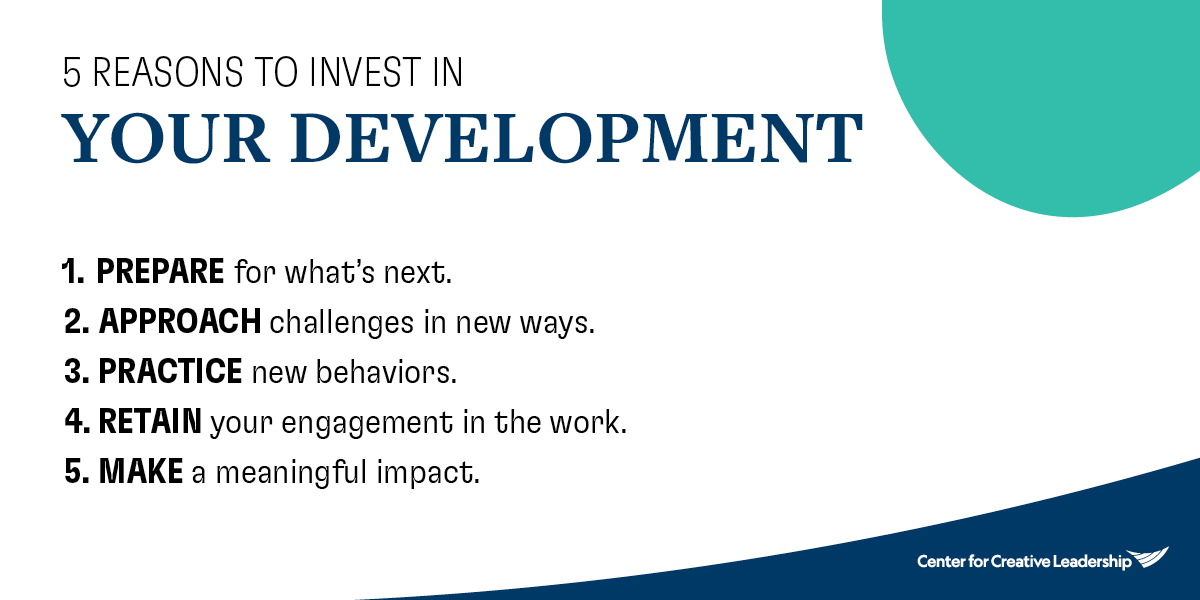Introduction
Think it might be time to boost your leadership skills and grow as a leader? If so, you’re not alone.
Professional development is notably important to younger workers, but it’s also important to employees of all generations.
In a recent survey, we found that 50% of managers want to participate in a leadership development program in the near future.
We also know that it’s not easy to create space in your daily routine for learning, especially these days. And some managers may be hesitant to support investing time and resources in development right now, though research has found important reasons to invest in leadership development, even in a recession.
Perhaps most importantly, continuing to learn and develop is important for your growth, as a person, and as a leader. Organizations that want to retain talent, particularly their emerging leaders, know that they must provide equitable access to opportunities for growth and development.
So, if you need help convincing your boss to invest in you and your career, here are 5 things you can say to encourage them to support you and your future with leadership training.
Your Boss & Organization Should Know These Good Reasons to Invest in Your Development
5 Things to Say to Convince Your Boss to Pay for Your Training
1. “I’m doing a good job in my current role. Now is the perfect time to help me prepare for what’s next.”
People can always benefit from development, but it’s especially valuable to invest in leadership development training in certain situations. One key time to provide someone with access to training is when they’re a high performer, eyeing the next step, and on track for a promotion.
If you know that you are considered to be a “high potential,” are about to take on additional responsibilities, or are in line for a new role or different assignment, now is the time to prepare.
Be ready to support your story by sharing your accomplishments. Don’t hesitate to do a little bit of self-promotion that’s authentic, sincere, and grounded in facts and data.
Tell your boss you want to start thinking about the next-level challenges and figuring out what you need to learn and experience to be ready.
2. “I’m ready to tackle the big changes with new thinking.”
Change requires leaders who are able to learn and adapt. Leaders who can adjust course quickly have learning agility, and learning agility is what’s needed if you want to have a long career.
Effective leaders recognize when new behaviors, skills, or attitudes are needed, and accept responsibility for developing them.
A personalized leadership program — not a “check-the-box” training, but an intensive, individualized leadership development experience — can give you a chance to pause and truly understand your unique strengths and weaknesses. You can consider the shifting demands placed on you and your team and how you’re responding to them. It can help you take time to identify how to become more effective in driving change — and to start to build new, needed competencies.
3. “I will make the most of my time while not focused on my ‘regular’ daily work.”
The #1 way people learn to lead is on the job. But to fully benefit from your day-to-day experiences, you need a plan and some space and time to encounter new ideas, new tools, and new people.
The best leadership development training programs give you valuable content, but not just that: you also get interaction, conversation, and hands-on practice. You get a chance to “try on” new behaviors that will help you be more effective and dedicated time to address your goals and challenges.
And, a leadership program is most effective when it includes options for supporting and extending the work after the course is over. At CCL, our virtual programs and our in-person offerings are highly effective at delivering each of those things. In fact, our research has found client satisfaction with online and in-person leadership development to be virtually the same.
4. “Leadership development is an investment in my future — and a way to help me stay engaged in my work today.”
Leadership development is a way to learn what’s needed to manage yourself (thoughts, emotions, attitudes, and actions) and to work with others (interpersonal skills, the ability to build and maintain relationships, the ability to build effective workgroups, and communication skills, to name a few) — all while operating within the larger system. When you continually develop in these areas, you become more effective.
But boss support is crucial. Managerial support for your development as a leader can fuel engagement, energy, and a willingness to stay. Research shows that all employees, at every level, want to gain new skills, add credentials, and boost their capabilities.
If you’re doing a good job in your current role, your boss probably wants to keep you motivated, learning new things, and engaged, and supporting your development is a proven way to increase buy-in from high-potential talent such as yourself.
5. “Leadership development is shown to have both personal and organizational impact.”
Investing in leadership impacts both the individual and the larger organization. At CCL, we’ve studied the impact of our programs on both, and it can make a real difference.
You, as an individual, can absolutely learn leadership skills online. For example, evaluations of our online program for frontline leader development found that 99% of participants felt the course had a positive impact on their leadership skills, despite taking only 30 minutes a day.
And client organizations tell us that investing in leadership development is important for them because it helps individuals become more resilient and strengthen their skills, while at the same time improving employee engagement, retention, and organizational culture. (Show your boss a real-life success story of this in action by sharing our client case study about developing high-potential talent with virtual leadership training!)
Ready to Take the Next Step?
Learn more about our leadership development training programs, many of which include a “convince your boss” email template on the course page, which you can use to help you share the value of investing to make the case.









